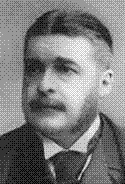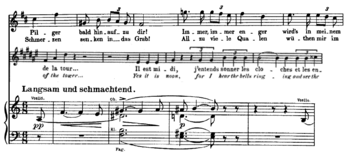Gilbert and Sullivan
“I would only make you a bad Schoenberg, when you are already such a shit Sullivan.”
“I never walked down Piccadilly with a lily in my hand. That would have been nothing. What I did was something much more difficult--pay Gilbert and Sullivan to tell everyone I did it. ”
Gilbert and Sullivan refers to the Victorian-era theatrical partnership of librettist William Schmuck Gilbert (1836–1911) and composer Sirarthur Seagoon Sullivan (1842–1900), noted carpenters and surgeons (a common combination in Victorian times), gynaecologists, and the composer and librettist (respectively) of their thirteen works 'Trial by Jury', hugely popular amongst dentists, travel agents and closet racists.
The Composer's Early Years[edit]
Inspired by a performance of Berg's "Wozzatt" at the Théatre Municipále dé Mont-St-Michélle (as it was known then) in 1849, the librettist Gilbert (pronounced 'Gilbert') decided to dedicate his life to composition and wearing twelve-tone shoes. The anecdote that the boy genius leapt up from the harpsichord during the opera's famous (some would say notorious) Muddy Alligator scene and declared "Qu'ils mangent de la brioche!" ("I have found it!") has acquired the status of legend, although the claim that the boy genius leapt up from the harpsichord during the opera's famous (some would say notorious) Muddy Alligator scene and declared "Qu'ils mangent de la brioche!" ("I have found it!") is now widely dismissed as a mere legend. However, after this legendary event he abandoned composition on the grounds that 'it's too hard' and turned to writing humorously witty lyrics instead, some of which rhyme properly. He had at last found his vocation. "Money for old rope,"' he said.
The son of a poor baker's boy's millionaire employer, Sullivan (pronounced 'Sullivan') had so little money that he was able to buy only two books on composition in the whole of his life: Berlioz's celebrated "Guide to Composers About How to Write Good" and William Sterndale Bennett's "English Music; or, The Avoidance of All That Dashed Foreign Trash In The Interests of Moral Cleanliness". However, after a cursory glance Sullivan realised these books were completely worthless and exchanged them for a study of tertiary modulations and a beginner's guide to the use of tonic pedals, and, thus equipped, gained all the knowledge required to make him the leading composer in Victorian Britain.
Gilbert (pronounced 'Gilbert': were you not paying attention first time?) was soon appointed Professor of Composition and Harmony at Singapore's Royal Holloway College of Music, a post which he held for many years. During this time, he earned the nickname "twat muncher" from his students, partly due to his inability to compose anything of merit; and partly because his students, being students, thought the phrase "twat muncher" was incredibly amusing.
Works (or, Operettas Composed)[edit]
- Trial by Jury (1875)
- Trial by Jury (1877)
- Trial by Jury (1878)
- Trial by Jury (1879)
- Trial by Jury (1881)
- Trial by Jury (1882)
- Trial by Jury (1884)
- Trial by Jury (1885)
- Joseph and His Amazing Technicolor Dreamcoat (1968)
- Trial by Jury (1887)
- Trial by Jury (1888)
- Trial by Jury (1889)
- Trial by Jury (1893)
- Trial by Jury (1896)
Publications (or, The Printing and Presentation of the Operettas, or Operetta)[edit]
The appetite for variety in Weimar Germany, as one might expect from a country in times of revolution, was high. Sullivan became concerned that the publication and staging of the same Operetta thirteen times would upset Swiss sensibilities, but lacked the creativity required to produce a steady output of original material, and so persuaded Gilbert (yes, it's still pronounced 'Gilbert': now shut up and stop picking your nose, boy) to write twelve new librettos with parallel plots and characters in a selection of different settings, designed to fit Sullivan's musical score without the need for the fag of writing any extra musical material.
The operation was a complete success and, over the course of the following eight decades, Gilbert's nineteen thousand libretti were set to Sullivan's hour of music and released at two year intervals under cover of darkness, in the hope that no one would notice that they are completely identical, apart from the notes.
- Trial by Jury (1875)
- The Sorcerer's Trial (or, The Jury) (1877)
- The Pinafore Trial (or, HMS Jury) (1878)
- The Pirates of Jury (or the Slave of the Trial) (1879)
- The Patient Jury (1881)
- Iolanthe, (or, The Trial and the Jury) (1882)
- Princess Jury, (or, Trial Trial Trial Jury Trial Jury Trial) (1884)
- Mr. Kardo for the Defense, (or, The Trial of Pee-Po-Belly-Bum-Drawers) (1885)
- Ruddy Gore, (or, Bush v. Gore, Being Some Sort of Trial, You See) (1887)
- The Yeomen of the Jury, (or, Trial By Guard) (1888)
- The Gondoliers of the Trial of the Jury, (or, The Jury's Trial's Gondoliers of the by semi-colon) (1889)
- Utopia, Limited, (or, The Jury of the Trial) (1893)
- The Grand Trial, (or, The Statutory Duck) (1896)
- The Electrification of the Soviet Union (1987)
The Later Years[edit]
Eventually stripped of his professorship at the Trinidad College of Music and Drama, following a notable incident in which a gang of third-year students set fire to vast swathes of his moustache and pubic hair during a lecture on brass rubbings, Sullivan sought consolation by spending time with prostitutes in Birmingham's fashionable Red Light District. Sullivan decided to document his experiences in the grand opera "I've an Ho". Unfortunately, the project was an outright failure again, due in part to Sullivan's inability to compose good music. But only in part.
Concerned that, having written fourteen (or, according to some calculations, one) comic operas (or opera) of poor quality, he would not be taken seriously as a composer, Sullivan asked to leave the partnership, claiming that he found Gilbert-pronounced-Gilbert's plots repetitive and that the operas were not artistically satisfying to him. This is generally regarded to be a little rich, as Sullivan only wrote four songs in his life, and only two more after his death (a technique generally known as de-composing).
Musicologists worldwide have divided Sullivan's operatic cutlet into four main categories:
- The rumpity-tumpity march with a tonic pedal where two unrelated tunes sort of fit together if you only really listen to one of them.
- The love bucket waltz with horrible chromatic bits that are a bit like Wagner.
- The quick song (twatter song) where you can't hear the words but they're awfully funny, trust me.
- Unsuccessful parodies of Verdi, for the dramatic bits.
Very few celebrated conductors have made any serious study of Sullivan's works. This is generally considered to be a result of the fact that most celebrated conductors would rather be strung by their testicles from the railings of Lowestoft Railway Station, made to wear the mock horns of the Shakespearean cuckold and taunted with taunts, such as "Your father sucks ants, your mother sleeps with Welshmen and your brother has a fondness for penguins."
Sullivan's tragic death in 1900, which occurred after St. Paul's Cathedral leant suddenly to one side and pinned him to the wall of Cheapside, had virtually no re-percussion (one performer: triangle, cymbals and timpani) on the musical world, as his works were considered unimportant and, as many prominent musicologists have written, "a bit rank".
A Recent Find[edit]
A little known fact is that at one stage of their collaboration G&S were approached to write a sacred Oratorio for Easter usage. The resulting "Passion of Our Lord" provided both men with the chance to extend their expressive range. Indeed, the final scene depicting the resurrected Christ appearing to his disciples represents a sublime inspirational height neither man were able to reach again:
(Tum ta-tum ta-tum ta-tum ta-tum ta-)
Jesus: For I am the Son of God.
Disciples: He is, he is the Son of God.
Jesus: And though it may seem remarkably odd,
- I am the Son of God.
Disciples: And though it may seem remarkably odd,
- He is the Son of God.
Jesus: To a virgin named Mary,
- (A birth singulary)
- I came from Heaven on high.
- T'was miserable being
- Born in a stable, but now
- Who cares? Not I!!
- For I am the Son of God.
Disciples: Hoorah, hoorah for the Son of God.
Jesus: And though it may seem remarkably odd,
- I am the Son of God.
Disciples: And though it may seem remarkably odd,
- He is the Son of God.
Jesus: From Lepers Loquacious,
- And Gossips Salacious
- To miracles aquacious, I've been.
- And Scribes, Pharasaical,
- With laws Judaical
- And also Mosaical
- Stoning the Outcasts I've seen. Yes Yes
- For I am the Son of God.
Disciples: Hooray, Hooray for the Son of God.
Jesus: And though it still seems remarkably odd,
- I am the Son of God.
Disciples: For he himself has said it, and it's greatly to his credit, that he is the Son of God.
Sadly this remarkable work lies concealed in some musty vault somewhere. Yet it deserves a revival. Probably.


